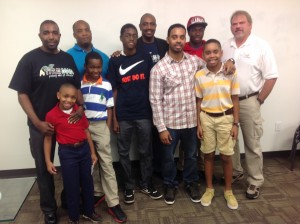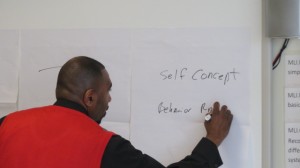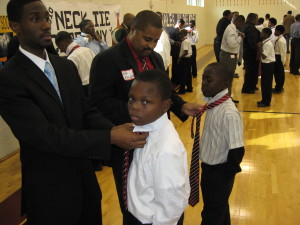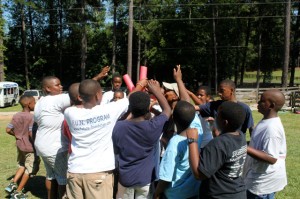Whenever my father passionately agrees with something he shouts, “I’m with you when you’re right!” After reading the recent report by Shaun R. Harper, Director of  the University of Pennsylvania’s Center for the Study of Race & Equity in Education titled Black Male Student Success in Higher Education, I’ve come to see a deeper meaning in my father’s catch-phrase. The report examines Black male college success in an effort to learn what works, what’s right, and to then replicate those factors more broadly. Harper calls this an anti-deficit approach. I call it a change in focus that is long overdue.
the University of Pennsylvania’s Center for the Study of Race & Equity in Education titled Black Male Student Success in Higher Education, I’ve come to see a deeper meaning in my father’s catch-phrase. The report examines Black male college success in an effort to learn what works, what’s right, and to then replicate those factors more broadly. Harper calls this an anti-deficit approach. I call it a change in focus that is long overdue.
Educators love to debate about whether targeted interventions can help at-risk populations, or if factors like poverty and being raised in a single parent household are too powerful to be overcome by schools alone. Some believe there is little to nothing that schools (K-12 as well as colleges) can do to prevent one third of Black men born this decade from spending time in prison; or to keep half of them from dropping-out of high school; or even to address that fact that just one in forty Black males will earn a bachelor’s degree by the time they are twenty-five.
This view, however, is wrong. There is much and more that schools and colleges can do to boost high-school and college achievement levels for Black males, and we can start by changing our focus. When we speak solely of deficit-model statistics, we risk flattening the landscape and obscuring the successes of students who are able to achieve in spite of all of the obstacles facing Black males. We also risk perpetuating systems of inequality by turning observation into expectation. Ultimately, our conception about what it means to be a young Black male doesn’t just limit our focus, it can limit that of our students as well. The innovation of Harper’s research has been to turn this data upside down and, instead of asking what’s wrong with the students who are failing, to ask what’s right with the Black males who see success. According to many of the subjects of Harper’s study, it was the first time anyone had bothered.
In interviewing 219 Black male “achievers” who were either attending or had graduated from college, Harper found the most common thread was that successful Black males are supported, both within their families and in their schools/communities, with relationships characterized by high expectations. Successful Black males often spoke of at least one extremely influential teacher who helped instill belief in their potential, whether or not the young men believed it themselves. These individuals, writes Harper, helped students seek out “educational resources to ensure their success — tutoring and academic support programs, college preparatory initiatives, and summer academies and camps.” According to Harper’s study, these commitments to education were solidified in high school and college when Black males joined student organizations — particularly when they took on leadership roles — that anchored them to academic communities.
 The idea that strong relationships impact student success shouldn’t be anything new to educators. But the implication — that race, background and gender are not destiny, and that focused interventions produce tangible results — is enormous. Specifically, by taking an anti-deficit approach, we light the way towards discovering and implementing educational interventions targeted to meet the specific needs of Black male students. When the dominant presentation of Black males shows them dropping out of school and spending time in prison, students who might already be unsure of their place within an educational environment feel further pressure to follow the expectation and disengage. This isn’t to say that we should ignore or sugar-coat the issues facing Black males today. But instead of fixating on these negative factors, we should balance them by holding up as examples young people who have successfully completed their education and earned degrees.
The idea that strong relationships impact student success shouldn’t be anything new to educators. But the implication — that race, background and gender are not destiny, and that focused interventions produce tangible results — is enormous. Specifically, by taking an anti-deficit approach, we light the way towards discovering and implementing educational interventions targeted to meet the specific needs of Black male students. When the dominant presentation of Black males shows them dropping out of school and spending time in prison, students who might already be unsure of their place within an educational environment feel further pressure to follow the expectation and disengage. This isn’t to say that we should ignore or sugar-coat the issues facing Black males today. But instead of fixating on these negative factors, we should balance them by holding up as examples young people who have successfully completed their education and earned degrees.
Perhaps the most remarkable finding in Harper’s report is that the majority of the Black male graduates he interviewed stated that the biggest factor separating them from peers who didn’t make it through college was serendipity. In other words, the achievers didn’t view themselves as smarter, more persistent, harder working, or more economically advantaged than their friends back on the block. The achievers felt they were just lucky. Lucky to have people in their lives who were with them when they were right. Everyone should be so lucky. And, with the right kinds of schools, everyone can be.
“Those who criticize our generation forget who raised it” ~ Unknown









